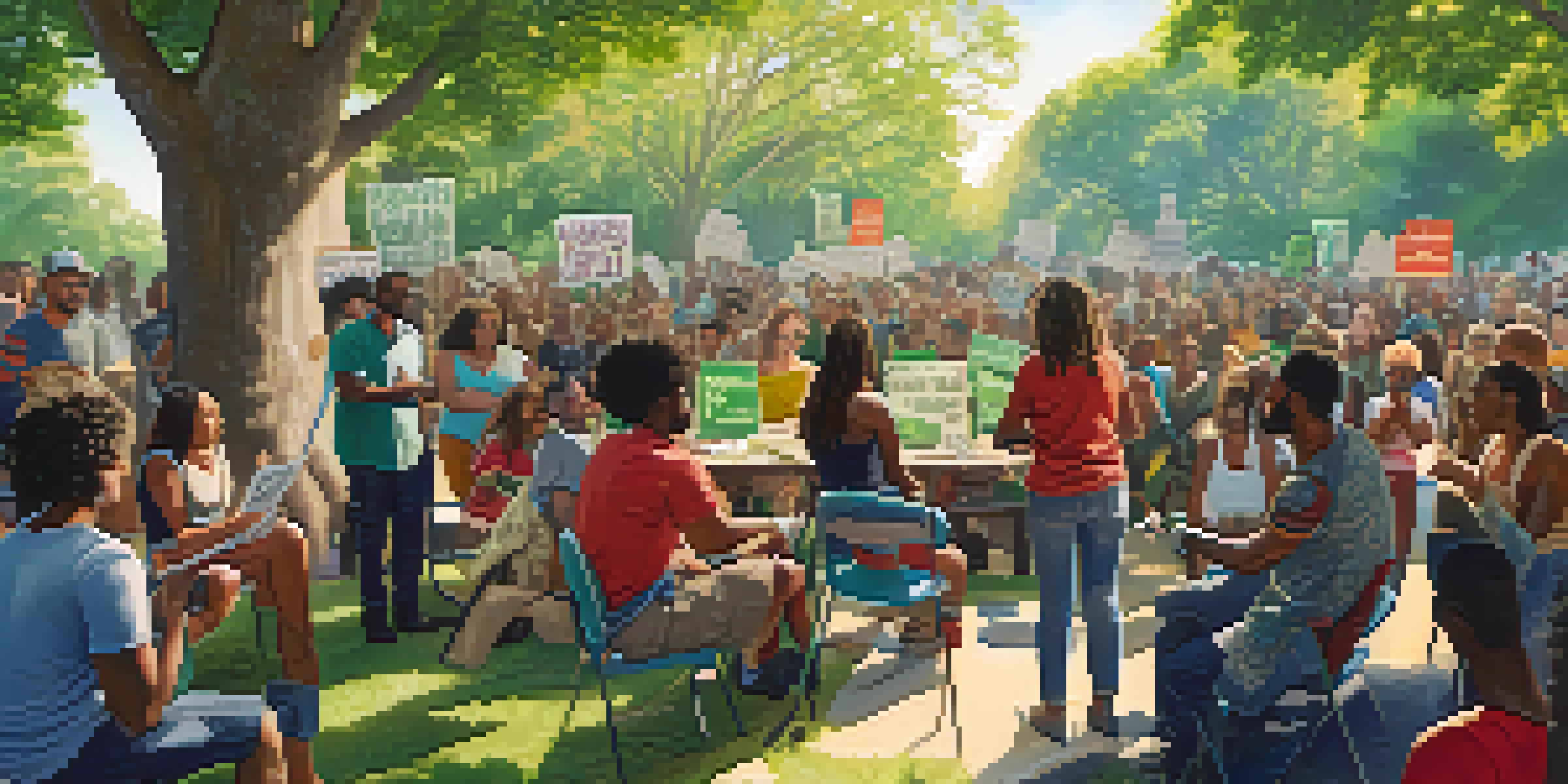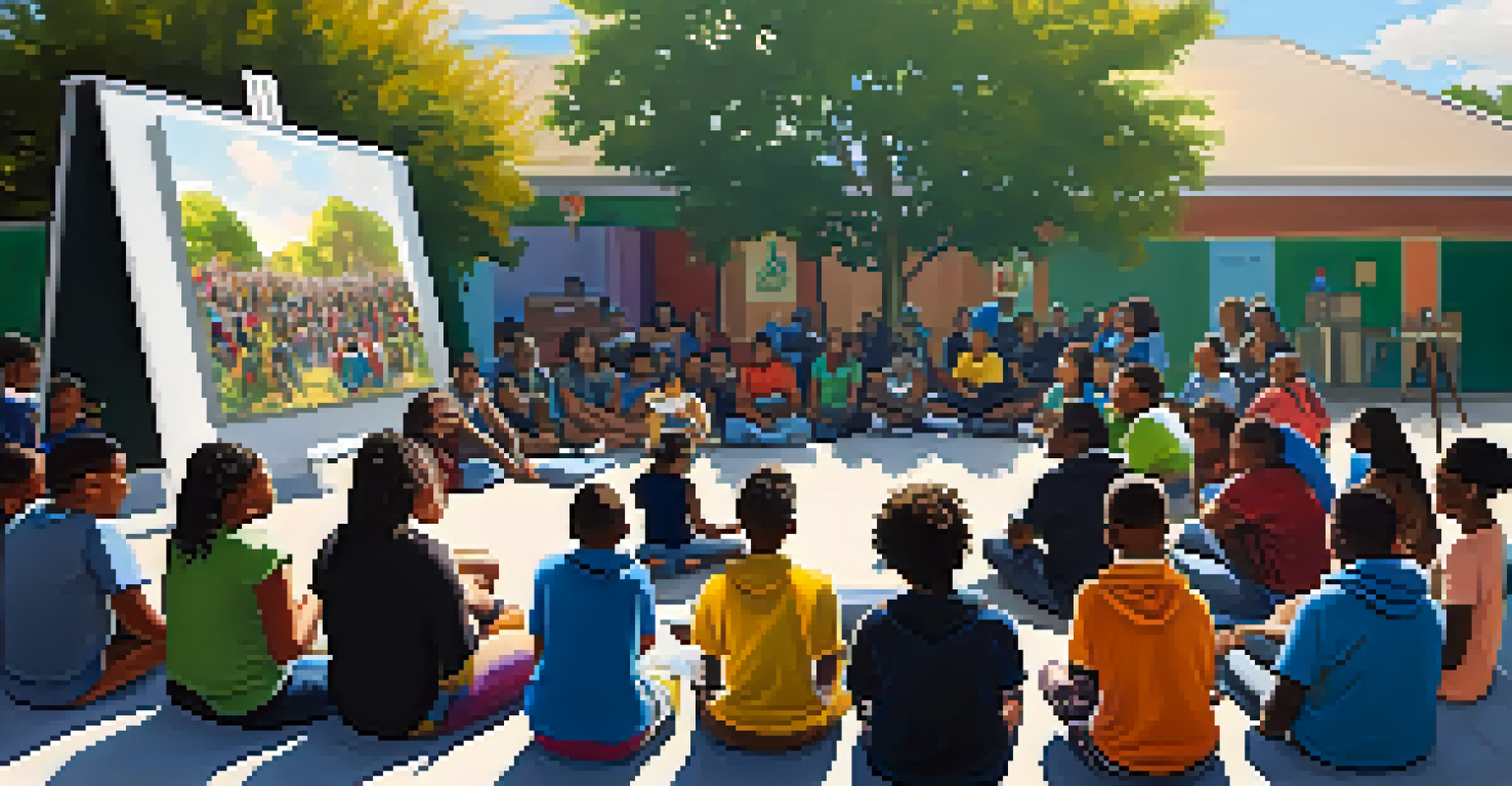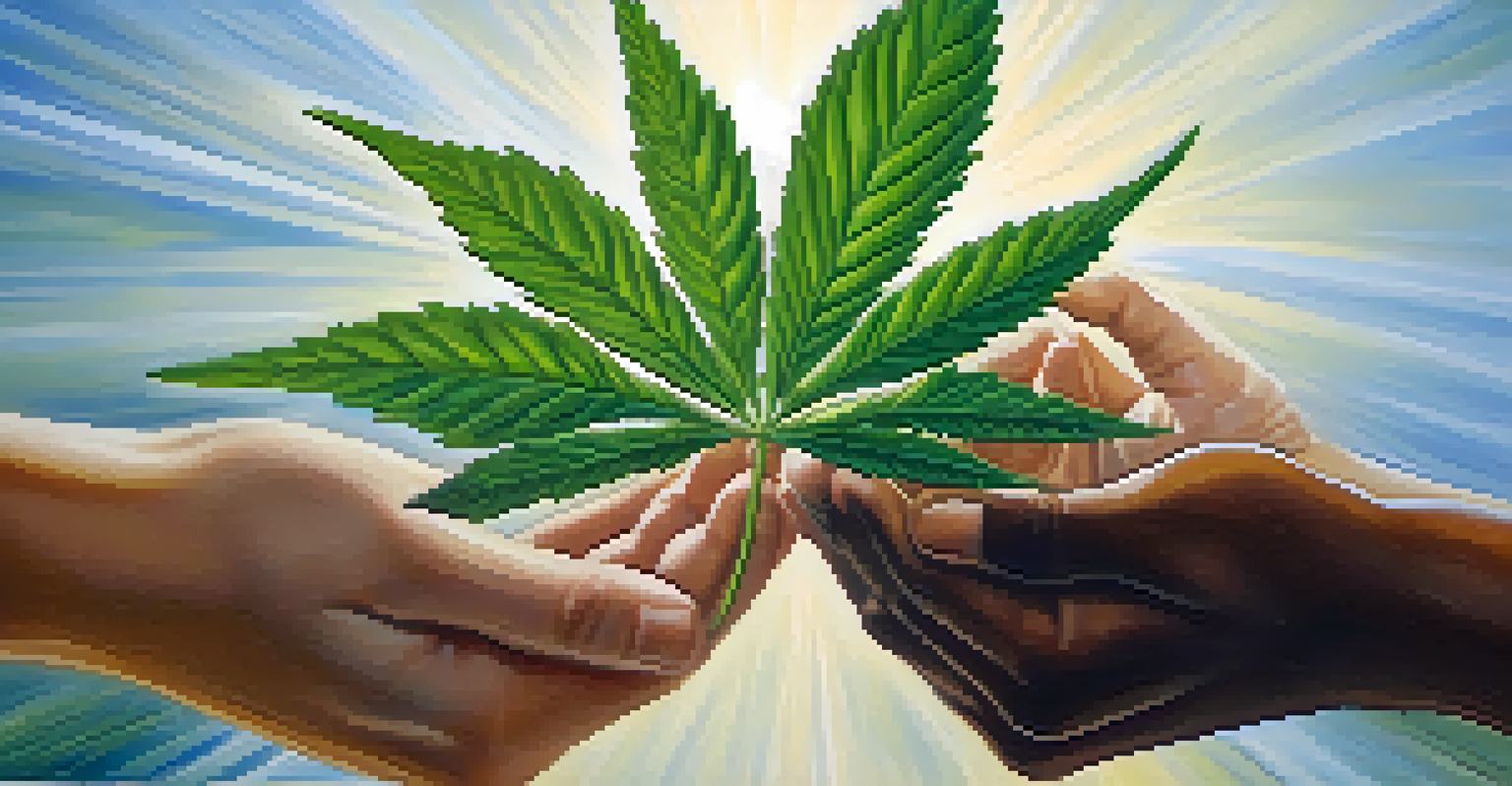Intersectionality in Marijuana Activism and Community Engagement

Understanding Intersectionality in Activism
Intersectionality is a framework that examines how various social identities—like race, gender, and class—interact and affect one's experience of oppression and privilege. In marijuana activism, this means recognizing that the fight for cannabis legalization isn't just about legal access; it also involves addressing historical injustices faced by marginalized communities. By understanding intersectionality, activists can advocate for policies that not only legalize marijuana but also rectify the social inequities ingrained in the war on drugs.
Injustice anywhere is a threat to justice everywhere.
For example, many communities of color have been disproportionately impacted by marijuana laws, facing harsher penalties and more significant social stigma. Recognizing these disparities is crucial for creating an inclusive movement that addresses the needs and voices of all individuals affected by cannabis policies. This holistic approach not only strengthens the activism but also fosters unity among diverse groups who share common goals.
Moreover, incorporating intersectionality encourages activists to consider the broader societal implications of their work. It allows for a richer dialogue about healing and reparative justice, ultimately creating a more equitable framework for marijuana legalization that benefits everyone, particularly those who have been historically marginalized.
The Role of Community Engagement in Advocacy
Community engagement is vital in marijuana activism as it builds trust and solidarity among diverse groups. Activists need to connect with local communities to understand their unique challenges and needs regarding cannabis use and legislation. By fostering these relationships, activists can create tailored strategies that resonate with the specific cultural and social contexts of each community.

For instance, hosting town halls or workshops allows community members to voice their opinions and share their experiences. This grassroots approach not only empowers individuals but also ensures that the activism is representative and inclusive. It helps dismantle the notion that marijuana reform is a one-size-fits-all issue, highlighting the importance of local narratives in shaping effective advocacy.
Intersectionality in Activism
Understanding how social identities intersect is crucial for creating inclusive marijuana activism that addresses historical injustices.
This community-focused strategy also provides an opportunity for education about the benefits and risks associated with marijuana use. When people are informed about these aspects in a supportive environment, they can make better decisions and engage more meaningfully in advocacy efforts. Ultimately, strong community engagement leads to more sustainable and impactful marijuana activism.
Historical Context: The War on Drugs
To fully grasp the intersectionality in marijuana activism, one must understand the historical context of the war on drugs. This campaign, which began in the 1970s, disproportionately targeted communities of color, leading to mass incarceration and social disintegration. The legacy of these policies continues to affect these communities today, making it imperative for activists to confront this history in their work.
The most common way people give up their power is by thinking they don’t have any.
For example, many individuals from marginalized backgrounds still face legal repercussions for past marijuana-related offenses, even as legalization gains ground. Acknowledging this history is crucial for activists who wish to advocate for fair policies that not only legalize marijuana but also provide pathways for those affected by these injustices to rebuild their lives. This includes expunging records and offering resources for those seeking to enter the legal cannabis market.
By addressing the historical injustices of the war on drugs, activists can create a more equitable landscape for marijuana legalization. This involves not just changing laws but also fostering healing within affected communities, ensuring that everyone can partake in the benefits of legalization without the burden of past oppression.
Amplifying Marginalized Voices in Activism
One of the core tenets of intersectionality is amplifying the voices of those who have been historically silenced. In marijuana activism, this means prioritizing the perspectives of marginalized individuals, such as people of color, women, and LGBTQ+ individuals. By ensuring these voices are heard, activists can create a more inclusive movement that genuinely represents the needs and aspirations of diverse communities.
For example, organizations led by individuals from marginalized backgrounds often have unique insights into the challenges faced by their communities regarding marijuana law and its enforcement. By collaborating with these organizations, mainstream activists can learn from their experiences and adopt strategies that are more effective and relevant. This collaboration not only enriches the movement but also fosters a sense of belonging and ownership among community members.
Community Engagement's Importance
Building trust and solidarity through community engagement ensures that marijuana activism is representative and culturally relevant.
Ultimately, amplifying marginalized voices contributes to a more equitable approach to marijuana activism. It shifts the narrative from a predominantly white, male perspective to one that encompasses the richness of diverse experiences, leading to more comprehensive and effective advocacy efforts.
Navigating Policy and Legal Frameworks
Understanding the policy and legal frameworks surrounding marijuana is essential for effective activism. This includes knowing the local, state, and federal laws that govern cannabis use and distribution. By being well-versed in these regulations, activists can better navigate the complexities of advocacy and work toward meaningful reform that aligns with their community's needs.
For instance, different states have varying laws regarding marijuana legalization, which can lead to confusion and disparities in enforcement. Activists must be equipped with the knowledge to advocate for policies that not only promote legalization but also address the inequities in how these laws are applied. This knowledge becomes a powerful tool in dismantling systemic barriers that continue to affect marginalized communities.
Additionally, engaging with policymakers and legal experts can enhance the activism's impact. By fostering relationships with those in power, activists can advocate for changes that reflect the intersectional needs of their communities. This collaboration helps ensure that the legal frameworks governing marijuana are equitable and just, ultimately benefiting all community members.
Challenges and Barriers to Intersectional Advocacy
Despite the progress made in marijuana activism, challenges and barriers still exist, particularly when it comes to intersectional advocacy. One significant hurdle is the lack of representation within the movement, which can lead to narrow perspectives and insufficient understanding of the complexities surrounding marijuana legalization. Without diverse voices at the forefront, crucial issues may be overlooked or inadequately addressed.
For example, some advocacy groups may focus solely on legalization without considering the broader social justice implications that affect marginalized communities. This oversight can perpetuate inequalities and leave vulnerable populations behind in the push for reform. Activists must remain vigilant in addressing these gaps to ensure that the movement is genuinely inclusive.
Future of Inclusive Advocacy
The future of marijuana activism lies in prioritizing social equity and collaboration to create equitable opportunities for marginalized communities.
Additionally, funding disparities can hinder intersectional advocacy efforts. Many grassroots organizations struggle to secure resources, which limits their ability to mobilize and create change. Addressing these challenges requires a collective effort to uplift marginalized voices and ensure that all activists have the support they need to advocate effectively for their communities.
The Future of Intersectionality in Marijuana Activism
Looking ahead, the future of intersectionality in marijuana activism holds great potential for creating meaningful change. As more people recognize the importance of inclusive advocacy, there is an opportunity to reshape the narrative around marijuana legalization. This shift can lead to policies that not only legalize cannabis but also address the historical injustices faced by marginalized communities.
Moreover, as the cannabis industry continues to grow, there is a chance to create equitable economic opportunities for those affected by past marijuana laws. By prioritizing social equity in business licensing and ownership, activists can ensure that communities historically harmed by the war on drugs can benefit from the legal cannabis market. This approach fosters a more just and equitable future for all.

Ultimately, the future of intersectionality in marijuana activism depends on continued collaboration, education, and advocacy. By working together to dismantle systemic barriers and uplift marginalized voices, activists can create a more inclusive movement that truly reflects the diverse tapestry of experiences and aspirations within the cannabis community.